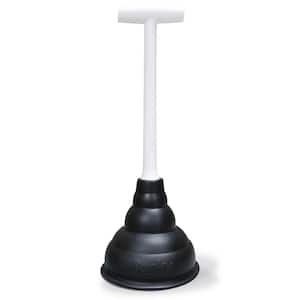Efficient Plunger and Drain Cleaners Methods: Key Guidelines
Efficient Plunger and Drain Cleaners Methods: Key Guidelines
Blog Article
We've unearthed this article pertaining to How To Use Your Toilet Plunger Correctly in 5 Easy Steps listed below on the net and accepted it made sense to discuss it with you here.

Intro
Appropriate upkeep of family drains pipes is essential for preventing clogs and making sure smooth water flow. One of the key devices in every house owner's toolkit is the plunger, alongside various drain cleansers developed to deal with persistent obstructions efficiently. This post discovers how to use plungers and drainpipe cleaners properly to maintain your drains pipes streaming openly.
Section 1: Understanding Plungers
Sorts of Plungers
There are several sorts of bettors readily available, each designed for various sorts of drains pipes and blocks. The most common kinds include cup plungers, flange bettors, and accordion bettors.
How Plungers Work
Plungers service the principle of developing stress and suction to dislodge obstructions. When properly used over a drain, they develop a vacuum that can take out debris or separate blockages.
Picking the Right Bettor
Selecting the appropriate plunger depends on the type of drainpipe and the nature of the clog. Mug bettors are ideal for sinks and bathtubs, while flange bettors are better fit for toilets because of their layout.
Typical Blunders with Bettors
Staying clear of these mistakes guarantees reliable plunging: improper seal around the drain, inadequate pressure, and unclear surrounding debris.
Area 2: Using Plungers Successfully
Prep work
Before diving, ensure the plunger covers the drainpipe entirely and forms a limited seal. Clear any kind of visible particles around the drainpipe opening.
Technique
Start with gentle plunging motions to build suction. Increase pressure slowly, utilizing a stable rhythm. Repeat as needed up until the drain removes.
Troubleshooting Tips
If plunging does not function, attempt changing the seal, applying petroleum jelly for a far better seal, or making use of a various kind of plunger.
Area 3: Comprehending Drain Cleansers
Types of Drainpipe Cleansers
Drain cleansers can be chemical or enzymatic. Chemical cleansers utilize strong chemicals to liquify clogs, while chemical cleaners make use of natural enzymes to break down raw material.
How Drainpipe Cleaners Job
Chemical cleaners respond with blockages to liquify them, while enzymatic cleaners break down natural materials like hair and grease without damaging pipes.
Security Factors to consider
Always put on handwear covers and eye protection when utilizing chemical drainpipe cleaners. Guarantee ample air flow and adhere to supplier instructions very carefully.
Eco-Friendly Alternatives
Take into consideration using vinegar and baking soda or enzyme-based cleansers for environmentally friendly alternatives that are more secure for pipelines and the environment.
Area 4: Utilizing Drainpipe Cleansers Effectively
Application Strategies
Pour chemical cleansers straight into the drainpipe opening. Allow them to help the advised time before flushing with warm water. Enzymatic cleaners must rest overnight.
Safety measures
Stay clear of mixing different kinds of cleansers, as this can create toxic fumes. Never ever utilize chemical cleaners in conjunction with a plunger, as splashing can occur.
Dealing With Persistent Obstructions
For relentless obstructions, think about utilizing a plumbing serpent or calling a specialist plumber to prevent damage to pipelines.
Verdict
To conclude, comprehending exactly how to use bettors and drainpipe cleaners successfully is important for maintaining healthy pipes systems. By selecting the right tools and strategies, home owners can deal with minor obstructions and stop major plumbing issues down the line.
How To Properly Use A Plumbing Snake To Clear Drains
When any drain clogs in our home arise, we tend to gravitate toward the plunger and little else. In cases where the plunger and its vacuum-created pressure are not able to clear clogs, many immediately move to harmful chemicals or simply call their plumber to fix the issue.
we’re happy to help with all drain cleaning needs and concerns. This includes informing you on a few other home remedies you may have at your disposal for minor to moderate clogs, one of which is the use of a plumbing snake. Many people have never used one of these before – let’s go over the steps to take when your drain clogs and you have a plumbing snake available.
Attempt Plunger Use
The first step here, as we noted above, should indeed be to grab your plunger when you notice a drain clog and attempt to resolve it this way. If you’re unsure how to use a particular type of plunger, our plumbers can answer any questions you have. If this doesn’t do the trick, however, you move on to the snake.
Locate And Prepare Snake
A plumbing snake is a metal or plastic device that’s generally about a quarter of an inch thick. It’s design with significant extensions, meant to reach down into your clogged drain and push the clog out. Snakes also contain drain augers that will latch onto and push stubborn blockages.
If your plunger doesn’t clear a clog, locate your snake and bring it to the drain in question. We also recommend keeping a bucket nearby to collect the clog once you pull it out, plus we’d advise wearing goggles and possibly protective gloves.
Feed Snake
Once you’re ready to go, feed the snake slowly down the drain, using the crank device it comes with to keep it moving until it finds the clog. Once this happens, much of the clog will be latched onto the coil so you can pull it out, while the rest will simply break up and flow downward.
Detach Debris
Remove the snake slowly from the drain, and once you’ve done so, pick off any debris that’s stuck to the coil. This is another area where wearing gloves is a must.
Flush Drain
Finally, take a few minutes to ensure the snake has done its job correctly. If you’ve been using it on a toilet, flush the toilet a couple times and make sure everything flows well. If you’ve used it on a different drain, flush it with some room temperature water.
https://www.mybuddytheplumber.com/blog/how-to-properly-use-a-plumbing-snake-to-clear-drains/

Application Strategies
Pour chemical cleansers straight into the drainpipe opening. Allow them to help the advised time before flushing with warm water. Enzymatic cleaners must rest overnight.
Safety measures
Stay clear of mixing different kinds of cleansers, as this can create toxic fumes. Never ever utilize chemical cleaners in conjunction with a plunger, as splashing can occur.
Dealing With Persistent Obstructions
For relentless obstructions, think about utilizing a plumbing serpent or calling a specialist plumber to prevent damage to pipelines.
Verdict
To conclude, comprehending exactly how to use bettors and drainpipe cleaners successfully is important for maintaining healthy pipes systems. By selecting the right tools and strategies, home owners can deal with minor obstructions and stop major plumbing issues down the line.
How To Properly Use A Plumbing Snake To Clear Drains
When any drain clogs in our home arise, we tend to gravitate toward the plunger and little else. In cases where the plunger and its vacuum-created pressure are not able to clear clogs, many immediately move to harmful chemicals or simply call their plumber to fix the issue.
we’re happy to help with all drain cleaning needs and concerns. This includes informing you on a few other home remedies you may have at your disposal for minor to moderate clogs, one of which is the use of a plumbing snake. Many people have never used one of these before – let’s go over the steps to take when your drain clogs and you have a plumbing snake available.
Attempt Plunger Use
The first step here, as we noted above, should indeed be to grab your plunger when you notice a drain clog and attempt to resolve it this way. If you’re unsure how to use a particular type of plunger, our plumbers can answer any questions you have. If this doesn’t do the trick, however, you move on to the snake.
Locate And Prepare Snake
A plumbing snake is a metal or plastic device that’s generally about a quarter of an inch thick. It’s design with significant extensions, meant to reach down into your clogged drain and push the clog out. Snakes also contain drain augers that will latch onto and push stubborn blockages.
If your plunger doesn’t clear a clog, locate your snake and bring it to the drain in question. We also recommend keeping a bucket nearby to collect the clog once you pull it out, plus we’d advise wearing goggles and possibly protective gloves.
Feed Snake
Once you’re ready to go, feed the snake slowly down the drain, using the crank device it comes with to keep it moving until it finds the clog. Once this happens, much of the clog will be latched onto the coil so you can pull it out, while the rest will simply break up and flow downward.
Detach Debris
Remove the snake slowly from the drain, and once you’ve done so, pick off any debris that’s stuck to the coil. This is another area where wearing gloves is a must.
Flush Drain
Finally, take a few minutes to ensure the snake has done its job correctly. If you’ve been using it on a toilet, flush the toilet a couple times and make sure everything flows well. If you’ve used it on a different drain, flush it with some room temperature water.
https://www.mybuddytheplumber.com/blog/how-to-properly-use-a-plumbing-snake-to-clear-drains/

I'm very fascinated with Here's How to Correctly Use a Toilet Plunger and I really hope you appreciated my blog post. Do you know somebody else who is in the market for the subject? Please feel free to promote it. I am grateful for being here. Don't forget to come by our website back soon.
Click For More Information Report this page